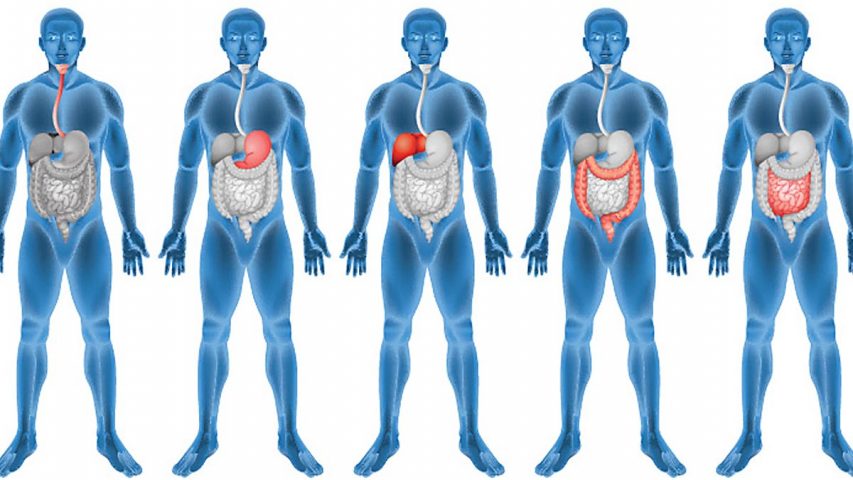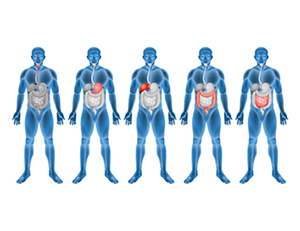- Have any questions? Contact us!
- info@dr-rath-foundation.org

The Benefits of Micronutrients in Non-Melanoma Skin Cancers
October 4, 2017
The Benefits of Micronutrients in Kidney Cancer
October 4, 2017Benefits of Micronutrient Synergy in Digestive Health


Our digestion has a huge impact on our efficiency and wellbeing. Thus, the cells of the digestive tract need a regular intake of certain micronutrients in order to do their highly specialized job.
The function of the digestive system is to convert the foods we eat into bioenergy that the cells can use for maintenance, growth and repair. Although we tend to think of the digestive system in terms of organs, such as the stomach, intestines, liver and pancreas, these digestive organs are made up of different types of specialized cells.
Digestion begins before you even put food into your mouth. Any smell, taste or sound associated with food prepares the digestive system for the food that will arrive. The cells lining the mouth secrete saliva containing the enzyme amylase, which helps in the digestion of carbohydrates. Chewing stimulates the cells of the salivary glands to release specific hormones that, in turn, stimulate the thymus gland to produce T-lymphocytes (white blood cells), which are essential for immune function.
The food then moves through the esophagus to the stomach and the small and large intestines. The esophageal muscles contract and relax, pushing food in a progressive wave motion (peristaltic movement) towards the stomach where enzymatic digestion begins. The stomach works as the body’s blender, chopping, dicing and liquefying food into a soupy liquid called chyme, which is the beginning of the process of protein digestion. Stomach cells also secrete hydrochloric acid (HCl), which is required for protein digestion and to kill microbes that come in with food, effectively sterilizing it. The cells lining the stomach provide intrinsic factor needed for vitamin B12 absorption. Digestion that occurs in the stomach and small intestine requires cooperation from the liver and pancreas.
The liver is an essential organ required for digestion. In addition to many other functions, the liver cells make bile, which helps break down fats. Specialized cells in the pancreas produce the digestive enzymes amylase, lipase and protease. These enzymes digest half of the protein and carbohydrates and 90% of the fats that we ingest. Moreover, the pancreas is critical for the production of insulin and regulation of blood sugar levels. Subsequently, the food moves to the small intestine where the final stages of enzymatic digestion occurs and where almost all nutrients are broken down and absorbed into the blood. The large intestine (colon) helps to absorb 90-95% of the water and to maintain the body’s fluid balance and the formation and excretion of waste products.
Digestion is a complicated task and the cells building the digestive tract are constantly being renewed. Optimum function of the cells of not only the digestive system but also those of the immune system, the hormonal system, the circulatory system and the nervous system is required to ensure that food is properly broken down and absorbed. A constant supply of essential micronutrients is critical for the functioning of all these cells. Poor dietary habits, diseases, pharmaceutical drugs and stress affect the functioning of the digestive system as they further contribute to a deficiency of micronutrients.
Micronutrients such as vitamins C, B6, B12 and folic acid are necessary for the normal functioning and maintenance of these systems. Moreover, betaine hydrochloride and the enzymes bromelain, papain, ginger root and peppermint are also important for supporting the digestive process. Daily supplementation with such synergistically acting micronutrients helps optimize the functions of the cells of the digestive system that distribute nourishment to the entire body. In order to benefit from a healthy lifestyle, it is important to care for the cells that help digest and distribute these micronutrients to each of the 60 trillion cells in our body.



